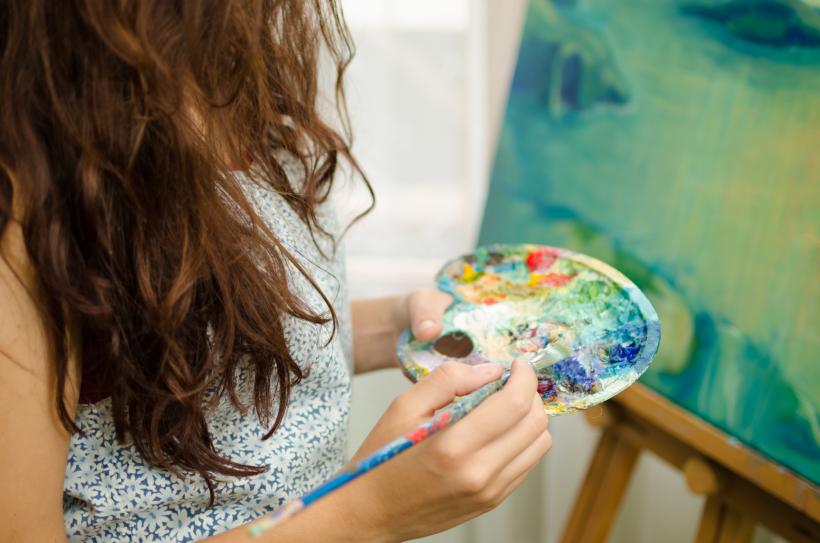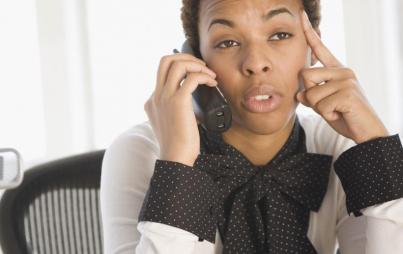
Hopefully these tips will help others too.
I wrote recently on Twitter: “Anxiety is the cold hand that grabs your neck in the middle of the night." For me, it’s waking up in the dark, using the bathroom, and telling myself not to look in the mirror as there may be the Boogie Monster behind me with a knife and a face determined to kill.
Or it’s the sleep paralysis that I’ve had, where someone crawled on top of me, and strangled me, until I was finally able to move, sitting up in bed gasping for air. That’s what my Tweet meant.
And it still scares the crap out of me thinking about it in the daytime. Plus, anxiety doesn’t have to have a connection at all with something that you’ve experienced. It’s the feeling of nausea when you step out of your normal routine. It’s the feeling that no one around you likes you or thinks that you’re smart. It’s the feeling that no matter what you do, you’re not good enough.
That’s what anxiety feels like for me, and it can take control without warning. Since I started therapy last year, I can finally start to identify when my anxiety is creeping up on me, and how I can combat it.
It doesn’t work every time (as I learned yesterday after a full day of anxiety), but the techniques that I use do seem to minimize it a little bit.
It wasn’t an easy day yesterday. I did go out of my comfort zone by changing my normal routine. Instead of taking my moped to work, I decided to catch the bus so I would be forced to run home and get some exercise.
When I got to the bus stop, I was fidgeting and that awful feeling of that cold hand sneaking up on me began to move its way from my stomach to my throat. I couldn’t figure out why I was having so much anxiety until it dawned on me that I had forgotten to take my medication that morning. Did I take it twice yesterday? I couldn’t remember. Now, that was causing my anxiety to skyrocket.
I got to work, and had to clean up the kitchen after everybody before making our 8:15 a.m. weekly meeting. Once I got to my desk, I struggled with having a cup of coffee or black tea — finally deciding that neither was a good idea since it wouldn’t help my anxiety.
The day just got progressively worse. I wanted to smoke so bad that it took every ounce of strength I had to fight it. At lunch I bought myself a stress ball, and didn’t let go for the rest of the day. After I got out of work, I ran to my therapist appointment. My anxiety was so high that I ran 1.5 miles in fifteen minutes —about a 10 minute/mile pace, when my average is around a 12:30/13:00 pace. I ran without earbuds, just listening to the sound of afternoon traffic white noise out the thoughts racing through my head.
I was scared that my brain was going to fly into hypomanic mood (since I also have Bipolar II/ Cyclothymia). Even during and after my therapy, I still was anxious, but I felt accomplished and happy about my achievement. Then I ran the other two miles home.
Even with all of the precautions that we take to help sway anxiety from creeping up on us, we still will have our bad days. But I found some techniques that may help a little bit. They are in no particular order. Most people will find one technique that works for them (or none, or any, or something not on this list that works). In which case, please respond and let me know what you do!
1. Stress Ball or Hand Grip Ball.
I just picked up this coping devise yesterday, and I absolutely love it. In fact, I wish that I had listened to my therapist ages ago and picked one up. Any time I feel like anxiety is creeping up, or I have a hankering for a cigarette, I grab my little stress ball and squeeze away. It also strengths your hands, wrists and forearms, so double bonus.
2. Running or Exercise.
This is hard for a lot of people in general, but when you have a mental health condition, exercise can be much harder to accomplish. In my case, I left myself no other option to get home than by running yesterday. It feels so good to get out on the road or your local park and let go of the day’s crap via exercise. After your workout, you will hopefully be more tired, though I have found myself to be more energetic afterwards. If possible, run at least four hours before your bedtime to give yourself time to decompress.
3. Meditating or Yoga Classes.
There was a time when I really enjoyed going to yoga, until it was taken over with overcrowded classrooms. Yoga is also very good for you, and I’m not telling you not to go. In fact, if you don’t run, I highly encourage you. My meditation now is sitting in my chair at work or home, or even on the bus, closing my eyes and taking three to four deep breaths and releasing. I envision all of my anxiety in my stomach floating off into space.
4. Go For A Walk Or Hike.
If neither running nor yoga is your cup of tea, just going for a twenty minute walk will help clear your thoughts. I find that especially after a heated disagreement with someone, it’s better to go for a walk and clear my thoughts before heading back to a very tense and anxious confrontation. I love to go at sunset, and will often side down at the water’s edge and take some photos. I’ll do some breathing as I watch the sun drop below the horizon, then walk back home at dusk. I even like to go for strolls at night as long as they are in a well-lit area, and I have my phone on me.
5. Encouraging Quotes.
It sounds corny, but I love to keep encouraging quotes on my desk. In fact, they are quotes that I personally write out on a post-it note and hang on my monitor where I will see it. Right now I have the word “Cope” on my desk. I think I’m going to change it to “Hope” today. I also will go online and print out a quote and either hang it in my office, or carry it with me in my wallet.
6. Art Therapy.
This is turning out to be a huge help for a lot of people in the mental health community. Using art as a way to deal with stress and anxiety is an excellent way to cope with your feelings and work out some solutions for yourself. It’s a lot like meditating, or getting in that runner’s zone. I love it because you don’t have to be good at art, and if you don’t particularly feel like seeing other people, you can do it from the comfort of your own home. I’ve set up make-shift photography studios in my apartment and have taken photographs of flowers, or food dye in vegetable oil. I also paint with acrylic on clothing and canvas. For a while, I was doing pretty well at selling my hand painted polka-dot canvas shoes.
7. Stop to Smell the Roses.
Sometimes, in our daily lives, we get so caught up with our phones, tablets, Facebook, Twitter and instant gratification that we forget to enjoy the small things in life. I try to put my phone away for an hour a day. An hour doesn’t seem that much until you finally realize how much you are addicted to it. When I have anxiety. I like to go outside from the office, close my eyes and just focus on the birds singing above me. Or listen to the whisper of the breeze, or the children playing in the park, or watch the sun set when I’m on a run or walk. Taking a break from our addiction to having that feeling of instant gratification really helps me.
8. Talk to A Therapist.
Seriously. Talking to a therapist really helped me with my anxiety. As a matter of fact, I resisted going until my body started breaking down with numerous digestive issues, fungal lesions breaking out on my body, and having a panic attack and blacking out at work one day. Many people still have the stigma that if you see a therapist that you are “crazy." I can assure you that I was in that same boat for half of my life. Now in my early forties, I realize that I really needed the help when I was still in high school.
Maybe if I had gotten help, I wouldn’t be in the state that I am now. It takes a lot of courage to seek help. And I always commend those who do. In fact, I’m so supportive that I started a support group for depression and bipolar disorder here in Honolulu. I want to encourage people to talk to others, and speak to a mental health professional. It used to be that only people with insurance would receive the medical treatment that they needed. Now under Obamacare, almost everyone with a mental health disorder has access to treatment. I’ve used it myself, and I think it’s better than private insurance.
9. Stay on Your Meds.
If you’ve already seen a therapist and psychologist, you’re probably on medication already. I know that feeling of wanting to get off because it limits your creativity. But I can assure you from my own experiences that missing one day can mess with your mind, body, and spirit. After missing just one dose, I find that it takes me about two days to feel normal again. Try to remember. Set a timer if you have to, or get in the habit of taking it right before you brush your teeth. I take mine in the morning before my coffee.
I do sometimes miss my doses, and it’s horrible. So stick with it.
10. Don’t Self-Medicate.
Before I got help, and even afterwards, I was self-medicating through tobacco and alcohol with the occasional marijuana puff or two. Smoking cigarettes or marijuana will alleviate some of the anxiety for a while, but it will come back to bite you tenfold. Soon you’ll be smoking a pack a day.
Alcohol is an even scarier demon to carry around for self-medication. Maybe that’s because someone I loved, who was very close to me growing up, was a binge drinker. I even started going down that road myself. I was up to a bottle and a half of wine a night for a while, and I was a binge drinker from my early twenties to my late thirties. Some would say that is normal, and I’m here to tell you that it’s not. It was a way for me to numb out all of my issues, and it didn’t help at all. I’m virtually alcohol free now, with the exception of two to three glasses of wine throughout the weekend. Never in the same evening. I know that my medication has helped incredibly.
Learning to cope with anxiety is difficult, and scary, even downright terrifying. But with the right coping mechanisms, you may find ways to tame anxiety, even if it’s only for a few minutes.







